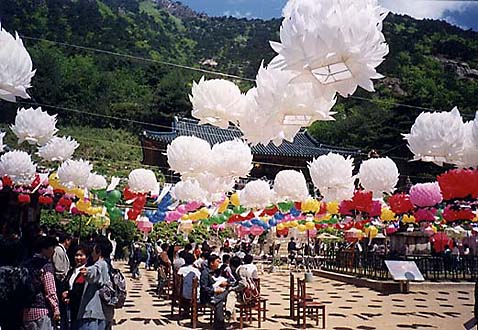

|
One of the traveler's guidebooks said of Kangnung (Gangneung) that there wasn't much of
great interest in the city, but that the Buddha's birthday celebrations were something to see. I can't agree with the first part of that statement. But the book was right about the Buddha's birthday. Kangnung does do it up right, with tremendously colorful festivities. They decorate the entire city with lanterns, and the temples put on shows and parades. The Buddha's birthday celebration is one of Korea's lunar calendar holidays - it's on the eighth day of the fourth lunar month.
The lanterns are the most visible indication that something's up. They're meant to be symbols
of the Buddhist quest for enlightenment. (They have little light bulbs in them. If only enlightenment
were as easy as plugging in a cord.) Most of the Korean flavors of Buddhism seem pretty keen
on the idea of praying to some kind of deity, so very often the
If you visit a temple on the Buddha's Birthday, you'll see people
washing the baby Buddha
(literally ladling water over a golden statue of him), and circling the pagoda in front of the temple
(this is called tapdori). If you want to try these things, feel free. You don't have to be a Buddhist,
but they'd appreciate it if you'd drop a couple thousand Won
Oh, and they'll feed you. Everybody gets lunch - no charge. Imagine how much work goes into fixing that meal. No doubt there are thousands of Koreans who otherwise never go near a Buddhist temple, but they'll go for the free food on the Buddha's Birthday. Of course you'll get a big dose of lanterns, hung in string after string across the temple yard. The ones we've seen in recent years are still nice to see, but not quite as colorful or varied as the ones in Margaret's picture above (shot in 2000, at one of the temples in the mountains near Kangnung). Nowadays most of them are mass-produced in China, instead of being handmade.
|